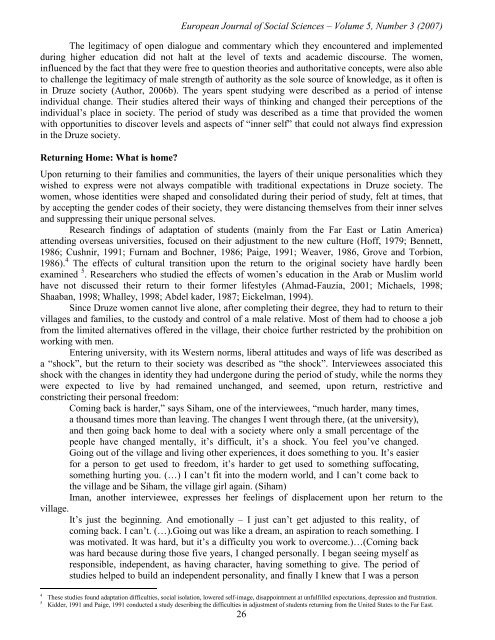european journal of social sciences issn: 1450-2267 - EuroJournals
european journal of social sciences issn: 1450-2267 - EuroJournals
european journal of social sciences issn: 1450-2267 - EuroJournals
You also want an ePaper? Increase the reach of your titles
YUMPU automatically turns print PDFs into web optimized ePapers that Google loves.
European Journal <strong>of</strong> Social Sciences – Volume 5, Number 3 (2007)<br />
The legitimacy <strong>of</strong> open dialogue and commentary which they encountered and implemented<br />
during higher education did not halt at the level <strong>of</strong> texts and academic discourse. The women,<br />
influenced by the fact that they were free to question theories and authoritative concepts, were also able<br />
to challenge the legitimacy <strong>of</strong> male strength <strong>of</strong> authority as the sole source <strong>of</strong> knowledge, as it <strong>of</strong>ten is<br />
in Druze society (Author, 2006b). The years spent studying were described as a period <strong>of</strong> intense<br />
individual change. Their studies altered their ways <strong>of</strong> thinking and changed their perceptions <strong>of</strong> the<br />
individual’s place in society. The period <strong>of</strong> study was described as a time that provided the women<br />
with opportunities to discover levels and aspects <strong>of</strong> “inner self” that could not always find expression<br />
in the Druze society.<br />
Returning Home: What is home?<br />
Upon returning to their families and communities, the layers <strong>of</strong> their unique personalities which they<br />
wished to express were not always compatible with traditional expectations in Druze society. The<br />
women, whose identities were shaped and consolidated during their period <strong>of</strong> study, felt at times, that<br />
by accepting the gender codes <strong>of</strong> their society, they were distancing themselves from their inner selves<br />
and suppressing their unique personal selves.<br />
Research findings <strong>of</strong> adaptation <strong>of</strong> students (mainly from the Far East or Latin America)<br />
attending overseas universities, focused on their adjustment to the new culture (H<strong>of</strong>f, 1979; Bennett,<br />
1986; Cushnir, 1991; Furnam and Bochner, 1986; Paige, 1991; Weaver, 1986, Grove and Torbion,<br />
1986). 4 The effects <strong>of</strong> cultural transition upon the return to the original society have hardly been<br />
examined 5 . Researchers who studied the effects <strong>of</strong> women’s education in the Arab or Muslim world<br />
have not discussed their return to their former lifestyles (Ahmad-Fauzia, 2001; Michaels, 1998;<br />
Shaaban, 1998; Whalley, 1998; Abdel kader, 1987; Eickelman, 1994).<br />
Since Druze women cannot live alone, after completing their degree, they had to return to their<br />
villages and families, to the custody and control <strong>of</strong> a male relative. Most <strong>of</strong> them had to choose a job<br />
from the limited alternatives <strong>of</strong>fered in the village, their choice further restricted by the prohibition on<br />
working with men.<br />
Entering university, with its Western norms, liberal attitudes and ways <strong>of</strong> life was described as<br />
a “shock”, but the return to their society was described as “the shock”. Interviewees associated this<br />
shock with the changes in identity they had undergone during the period <strong>of</strong> study, while the norms they<br />
were expected to live by had remained unchanged, and seemed, upon return, restrictive and<br />
constricting their personal freedom:<br />
Coming back is harder,” says Siham, one <strong>of</strong> the interviewees, “much harder, many times,<br />
a thousand times more than leaving. The changes I went through there, (at the university),<br />
and then going back home to deal with a society where only a small percentage <strong>of</strong> the<br />
people have changed mentally, it’s difficult, it’s a shock. You feel you’ve changed.<br />
Going out <strong>of</strong> the village and living other experiences, it does something to you. It’s easier<br />
for a person to get used to freedom, it’s harder to get used to something suffocating,<br />
something hurting you. (…) I can’t fit into the modern world, and I can’t come back to<br />
the village and be Siham, the village girl again. (Siham)<br />
Iman, another interviewee, expresses her feelings <strong>of</strong> displacement upon her return to the<br />
village.<br />
It’s just the beginning. And emotionally – I just can’t get adjusted to this reality, <strong>of</strong><br />
coming back. I can’t. (…).Going out was like a dream, an aspiration to reach something. I<br />
was motivated. It was hard, but it’s a difficulty you work to overcome.)…(Coming back<br />
was hard because during those five years, I changed personally. I began seeing myself as<br />
responsible, independent, as having character, having something to give. The period <strong>of</strong><br />
studies helped to build an independent personality, and finally I knew that I was a person<br />
4 These studies found adaptation difficulties, <strong>social</strong> isolation, lowered self-image, disappointment at unfulfilled expectations, depression and frustration.<br />
5 Kidder, 1991 and Paige, 1991 conducted a study describing the difficulties in adjustment <strong>of</strong> students returning from the United States to the Far East.<br />
26

















